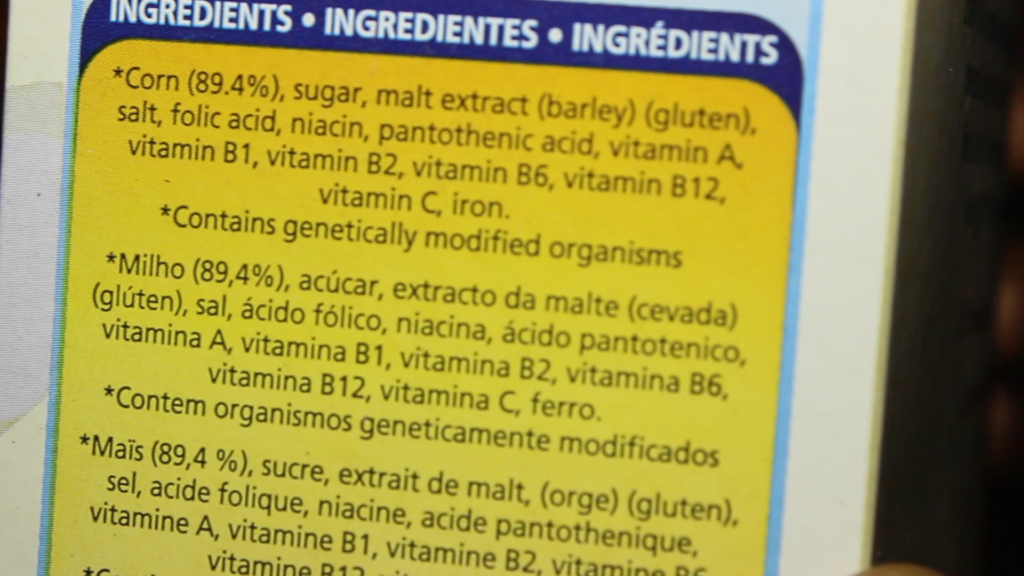In Mozambique, a country where 64 percent of the population is food insecure, no one cares about the processes used to produce food. They are only glad to have it.
As a result, though Mozambique has not yet approved the use of genetically modified crops, supermarkets there are already selling imported GM products to excited consumers. The nation’s citizens, it seems, are ready to accept the commercialization of GMOs — if it means more food on their tables.
I paid a visit to some supermarkets at Bilene, a popular beach town in Southern Mozambique, where I found biscuits, cornflakes, flour and other products on the shelves imported from neighboring South Africa, where farmers are allowed to grow GMOs. The products were labeled with various inscriptions, such as “the maize is produced using genetic modification” and “contains genetically modified organisms.”

The shop attendant did not know the difference between products labelled as GMOs and those that are not. But she did know that customers are buying the products on her shelves without even reading the labels.
“People in Mozambique are not worried about GMOs,” Rose Moreira, who works with National Agricultural Research Institute of Mozambique, told the Alliance for Science. “They are willing to have very good products from industry, commerce and technology. People are not looking at what they have on the shelves. They are looking at the way they will have it on their plates.”
Tests began in 2017 on the first GM crop in Mozambique: Water Efficient Maize for Africa (WEMA), which has inherent resistance to drought and pests. But navigating the 2007 decree on biosafety, which allows for development and commercialization of GM crops, is a cumbersome process. It will take a few more years before local GM products can be approved for introduction to the market for the benefit of farmers and the public.
The residents say they look forward to the GM products hitting the market to increase production and cut down on importation. Nelson Salvador Balate, local youth leader for Mozambique’s governing political party at Bilene, told the Alliance for Science: “If we get technology, for example, genetic modification, we can get more production. If we get it locally, it will be good for us.”
Local authorities say Mozambique is poised to join the rank of GMO crops producing countries. “Mozambicans are fully ready for biotechnology,” said Soares Almeida Xerinda, board chairman of the government irrigation organization Hydraulics of Chokwe. “We have already got some of the technologies like plant tissue (culture). So I think we can get there.”
Plant breeder Samuel Camilo is calling for more education on the technology as the country prepares to commercialize the first GMO product. “GMO is something new … there is a misconception that GMO is nothing good. But since people have not been in contact with those experiments, they don’t know what GMO is and what it looks like,” he said. “They need to know that GMO maize is like normal maize. And that it is good to have this crop to deal with drought and deal with pests.”
Dr. Pedro Fato, who leads the WEMA breeding project, said that education is already ongoing as part of the GM crop trial underway. “The transgenic (GMO) issue in Mozambique is new. The people have different opinions. But our role is to develop the technology and show that it works. And in many cases the problem is lack of information….we are ensuring awareness and it looks like it’s working,“ he noted.
Out of the more than 50 countries in Africa, only four have approved GMOs for the local food chain and farming system: South Africa, Burkina Faso, Egypt and South Sudan. About 12 African nations are conducting field trials to allow for their introduction, but others have announced a complete ban on such products.
Political figures in Mozambique are convinced biotechnology could have a bright future in their country and help play a crucial role in the development of the nation’s economy, though work hasn’t yet started on any crop apart from maize. “Technologies like GMOs will be accepted because everything that will help get more yield will be accepted. Not only with maize but other crops like rice. Not only GMOs but all other seeds that will help agriculture,” Artur Manuel Macamo, political administrator of the Chokwe district in Mozambique’s Gaza province, explained.
Local farmers hold a similar view that biotechnology could dramatically transform agriculture in Mozambique. Citing the WEMA varieties as an example, farmer Armahdo Bule noted: “WEMA is providing solutions for problems and will increase productivity.”
